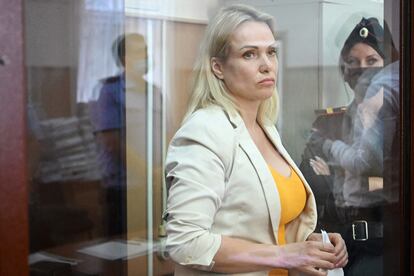Moscow court sentences journalist who protested war on state television to eight and a half years in prison in absentia
Marina Ovsyannikova, who interrupted a live broadcast of one of Russia’s most-watched news programs and also called Vladimir Putin a killer, lives in France under consular protection


Russian journalist Marina Ovsyannikova has been sentenced in absentia by a Moscow court to eight and a half years in prison for discrediting the military. The former editor of the international section at the state-owned Pervyi Kanal (Channel 1) became world famous in March 2022, just weeks after the Russian invasion of Ukraine began, for appearing in the middle of one of the country’s most-watched news programs with a sign reading “No war. Don’t believe the propaganda. They’re lying to you here”, with an additional line at the bottom of her placard in English: “Russians against the war.” Ovsyannikova’s sentence, however, stemmed from another protest action: a personal picket in front of the Kremlin that she carried out shortly afterwards.
The Russian justice system claims that Ovsyannikova, who was also banned from publishing anything on the internet for four years, intended to “contribute to the growth of social tension.” In her second protest, the journalist displayed another poster with the phrase: “Putin is a killer. His soldiers are fascists. 352 children have been killed (in Ukraine). How many more children need to die for you to stop?”
A day before the hearing, in which she was charged with spreading false information about the Russian Army, Ovsyannikova posted a message on her Telegram channel addressing the court. “Dear judge, you know very well that the criminal charges against me are absurd and politically motivated,” her social media post began.
The journalist continued: “Sometimes I ask myself: could I have kept quiet? No, I could not. Keeping silent in the face of an aggression means becoming an accomplice to the crime. I know what war is. As a child, I experienced the same thing that Ukrainians are experiencing now. My house was razed to the ground during the First Chechen War.” Ovsyannikova stressed in her message that the figures on children killed in the war in Ukraine war are released by the UN, of which Russia is a member.
“I made a very difficult moral decision, but the only right one in my life and I have paid a very high price for it,” Ovsyannikova continued. “My punishment has been exile: life in a foreign country, without family, friends, home, job and, most importantly, without the opportunity to return to my native land and embrace my loved ones. There is only one life and it is stupid to sacrifice it for the benefit of war criminals. By remaining free, I will be able to contribute much more both to Ukraine and to the beautiful Russia of the future!”
The journalist, who has been accused by some critical voices in Europe of being a Russian agent on the grounds that she has not been convicted so far, unlike other dissidents, is currently living in France, under the consular protection offered to her by President Emmanuel Macron.
The former news editor was under house arrest when she fled Russia in October 2022 along with her daughter, then 11 years old. Her son, however, decided to stay in Moscow with his father, who sued Ovsyannikova to obtain custody of the minors. In a video pre-recorded before her televised protest, she said she was “ashamed of working for Kremlin propaganda.”
Ovsyannikova initially moved to Germany where she was hired by the Die Welt newspaper, sparking criticism and an intense debate over the opportunity offered to a former employee of Moscow’s propaganda machine. For his part, Ukrainian President Volodymyr Zelenskiy applauded Ovsyannikova’s gesture, although journalists criticized her over her past Kremlin links and a press conference she held in Kyiv was boycotted.
Sign up for our weekly newsletter to get more English-language news coverage from EL PAÍS USA Edition
Tu suscripción se está usando en otro dispositivo
¿Quieres añadir otro usuario a tu suscripción?
Si continúas leyendo en este dispositivo, no se podrá leer en el otro.
FlechaTu suscripción se está usando en otro dispositivo y solo puedes acceder a EL PAÍS desde un dispositivo a la vez.
Si quieres compartir tu cuenta, cambia tu suscripción a la modalidad Premium, así podrás añadir otro usuario. Cada uno accederá con su propia cuenta de email, lo que os permitirá personalizar vuestra experiencia en EL PAÍS.
¿Tienes una suscripción de empresa? Accede aquí para contratar más cuentas.
En el caso de no saber quién está usando tu cuenta, te recomendamos cambiar tu contraseña aquí.
Si decides continuar compartiendo tu cuenta, este mensaje se mostrará en tu dispositivo y en el de la otra persona que está usando tu cuenta de forma indefinida, afectando a tu experiencia de lectura. Puedes consultar aquí los términos y condiciones de la suscripción digital.








































